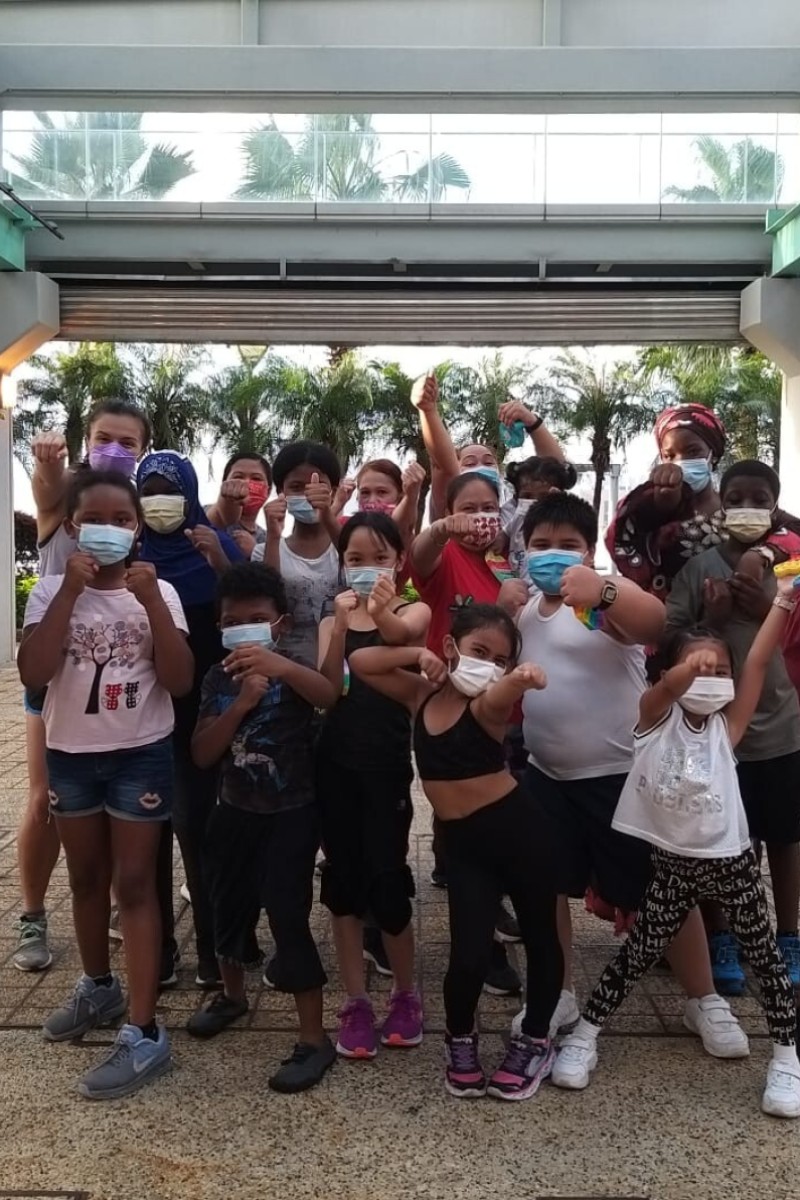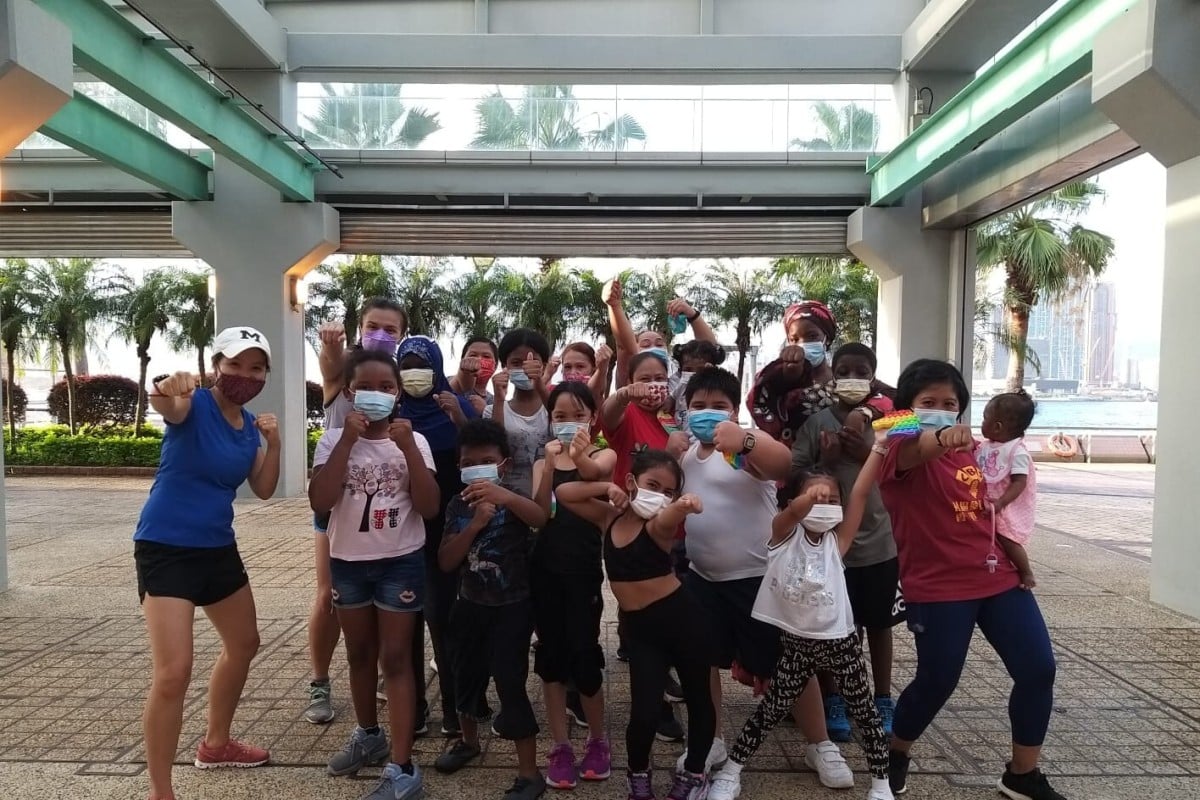
The NGO helping to empower Hong Kong’s refugee population
- Grassroots Future is raising money to cover the school fees for children of asylum seekers and launch a new sustainable fashion programme
- Life for refugees has only gotten more difficult since the start of the Covid-19 pandemic
 Hong Kong-based NGO Grassroots Future helps the city’s refugees by covering school fees for children and offering classes, such as a self-defence class, to enrich and empower people’s lives. Photo: Grassroots Future
Hong Kong-based NGO Grassroots Future helps the city’s refugees by covering school fees for children and offering classes, such as a self-defence class, to enrich and empower people’s lives. Photo: Grassroots FutureFilipino refugee Shirley Ballesberos has been trying her hardest to help refugees and homeless locals in Hong Kong – even though she and her 8-year-old daughter need the help as well.
Ballesberos, 50, volunteers at Grassroots Future, a non-profit organisation that focuses on helping the city’s asylum seekers through providing financial assistance and activities that give them new skills.
While refugees in Hong Kong are given a subsidy of HK$3,000 (US$386) a month from the government, many of them have said that the amount is not enough, given Hong Kong’s sky-high rents and other costs of living.
What life is like for refugees in Hong Kong
Children of asylum seekers can go to school for free the way other local children do, but many refugees struggle to pay for the school uniforms, textbooks and digital devices required for their education.
Grassroots Future has been providing financial aid to these children, including Ballesberos’ daughter.
But its resources are running dry because it has been unable to launch enough fundraising events due to Covid-19 social distancing rules.
It now needs to raise HK$250,000 (US$32,153) to fund school fees for about 20 children and to organise more empowerment programmes for refugees.
People share food at an event for World Refugee Day. Photo: Grassroots Future
‘God’s way of blessing us’
The help from the NGO had been so essential for Ballesberos, she said, that it sometimes makes her cry.
“I feel like it’s God’s way of blessing us – he helps us,” she said.
Ballesberos came to Hong Kong in 1995 and worked as a domestic helper, sending money home to support her two young sons. She was terminated from her job in 2007, and her employer refused to pay her benefits, which are required by law at the end of a contract.
Famous people you may not have known were refugees
She tried to bring that employer to court, but when her visa expired, she did not have the money to apply for a new one.
Eventually, she decided to remain in the city without a visa to keep working to support her family, as wages in Hong Kong were better than in the Philippines.
In 2012, Ballesberos was sent to the Lo Wu Correctional Institution for overstaying her visa. At the time, she was seven months pregnant. She applied for refugee status and was released from the facility to give birth to her daughter in a hospital.
Shirley Ballesberos came to Hong Kong to earn money for her children, as the wages are better in the city than in her home country of the Philippines. Photo: Shirley Ballesberos
Her daughter is now eight years old and happy with her life in Hong Kong – the only home she has ever known. Ballesberos’ two sons in the Philippines are grown, with jobs and lives of their own.
“My daughter wants to stay in Hong Kong,” said Ballesberos. “Life in the Philippines is very tough, and it’s only gotten worse during Covid.”
Many of her friends and relatives in the Philippines have lost their jobs during the pandemic.
“Kids have to enjoy life, and I don’t want my daughter experiencing what I experienced,” she said, expressing her worries about crime and drugs in the Southeast Asian country.
Asylum seekers share their stories and recipes
Giving and receiving
After hearing from a friend that the Refugee Union, a refugee-run society, could help with her family expenses, she started volunteering there six years ago. She collects donated items such as food and clothes and distributes them to members of the union.
She also recently started volunteering at Grassroots Future, which works in collaboration with Refugee Union. She organises attendees for their workshops and collects food to distribute not only to other refugees, but to homeless locals, too.
“I can make people happy and reduce their burden. I want to help other people who are not allowed to work and don’t have money,” she said.
The teen who launched an initiative to help migrants learn new skills
In addition to providing financial assistance, Grassroots Future offers weekly classes for adults and kids, such as art classes to help people express their feelings, and crochet classes to teach them to make bags and wallets. About 30 to 40 people regularly attend these sessions.
“There’s also a self-defence class, which is good for the body and a great bonding experience for parents and children,” said Ballesberos, who attends the class with her daughter.
The charity also organises maths classes, which are useful for the children who struggle to learn maths when their teachers speak in Chinese.
A photo from a cooking workshop organised by Grassroots. Photo: Grassroots Future
Covid-19 has made life even more difficult
Tegan Smyth, who founded Grassroots Future five years ago, explained that the 13,000 refugees in Hong Kong face many challenges.
They often wait 10 years or more to be resettled outside the city. During this time, they are not legally allowed to work, and must live on a monthly government subsidy of HK$3,000, of which HK$1,500 is allocated for rent.
The Covid-19 pandemic has only made life more complicated for the city’s already-struggling asylum seekers.
Hong Kong must do more to protect its domestic helpers
“Refugees weren’t eligible to get the Covid-19 vaccine until recently,” Smyth said. “There’s also a lot of misinformation spreading around, as well as a lack of access to medical resources.”
Getting daily necessities has become more difficult, as prices in shops have risen while the government subsidy has stayed the same. There have also been shortages of much-needed goods.
Hong Kong failed the ethnic minority community during the pandemic
Smyth’s interest in refugee issues stems from her time training as a lawyer, when she worked at a legal centre in Australia that provided law advice to refugees and new migrants.
In the past, Grassroots Future would raise money through regularly holding events and workshops – the most notable being Table of Two Cities, in which an asylum seeker cooks food from their home country and shares their story with dinner guests, allowing them to learn more about each other through food.
However, because of social distancing regulations and concerns over the virus, Grassroots Future was only able to hold three events last year.
Tegan Smyth (second from right) pictured at a community potluck put on by Grassroots Future. Photo: Grassroots Future
Growing for the future
The many difficulties posed by the pandemic have not stopped the organisation from continuing to create new programmes. Currently, it is looking to launch a new sustainable fashion education initiative.
“We’re always looking for ways to get the community involved in sustainability, as well as learn skills that are transferable,” said Smyth. “The initiative we’re launching is a 10-week programme that’s all about product development.”
What has China achieved in its fight against extreme poverty?
“We’ll be working with a small group of people and training them to make garments and accessories from scratch using eco-friendly, plant-derived yarns, letting them get some hands-on experience building a portfolio of work and a personal brand,” she said.
Programme participants will also develop their leadership skills, as they will be encouraged to teach others in their community.
“It’s focused on giving people the ability to make their own garments and develop a life skill,” she said.
Learning to crochet can give a sense of accomplishment, as it feels good to make something from scratch with your own hands. Photo: Grassroots Future
The programme aligns with the NGO’s main goal: to empower people in the refugee community to fulfil their potential and become self-reliant, sustainability-minded global citizens. The programmes can also give them a sense of comfort amid their unstable situations.
“Families feel so happy and blessed because Grassroots Future is such a big help for us,” said Ballesberos. “The activities help our mental and physical well-being and give us confidence. They’re the only ones that help us.”
You can look here for more information on Grassroots Future and its crowdfunding initiative.
